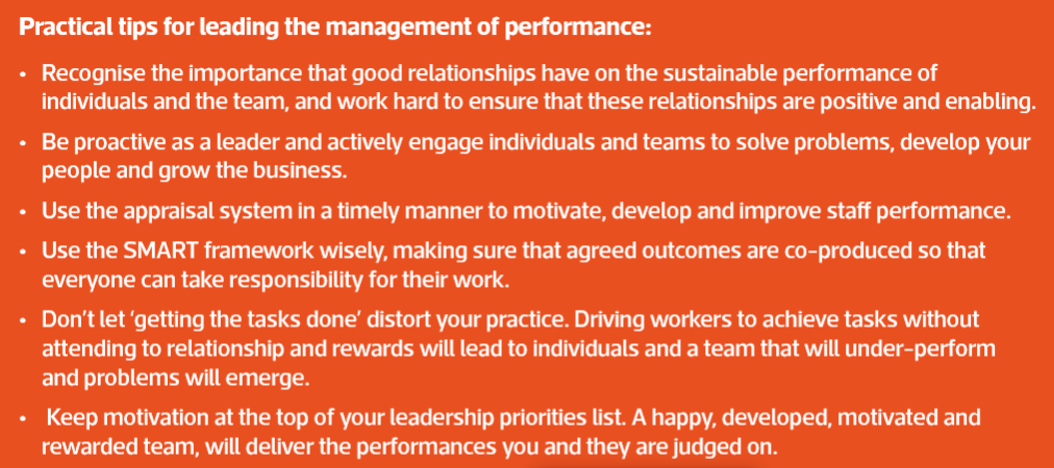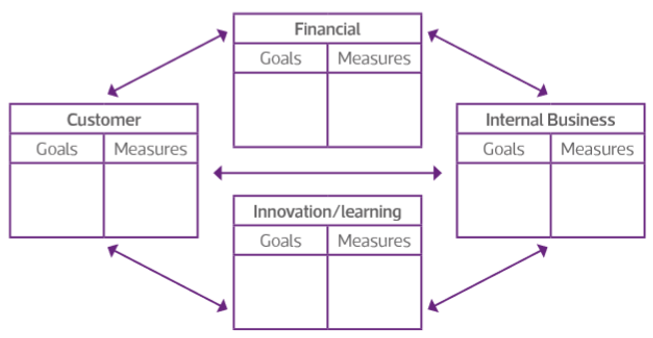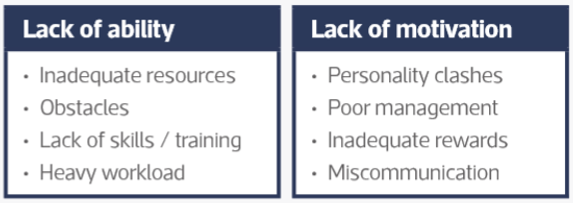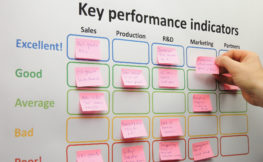Performance management is an ongoing process where you and your employee work together to plan, monitor and review individual work outcomes, future goals, and development needs. Achieving leaders set clear expectations, monitor performance and give feedback. Individual outcomes contribute to team goals and the overall goals of the business.
Performance management models
Performance management activities do not exist in a vacuum but are part of an overall management system that sets, delivers, measures, monitors and reviews performance. There re many performance system models, including this example by Kaplan & Norton (1992). This model uses a Balanced Scorecard which provides visual representation of performance from four perspectives.
The overall goals of the business are broken down into a small number of key goals and measures which are written down on each card in the areas shown. These goals and measures are cascaded down throughout the business. All performance achievements are collated and a measure highlighted on the scorecards. These measures include; goals achieved, behind schedule, in progress etc. Feedback on progress against the business goals is easily and regularly shared so that adjustments can be made if needed, to improve the performance.
Much of the literature in recent years tries to explain why performance system models have gaps between what needs to be achieved and what is achieved, which has renewed the focus on understanding how leaders can improve performance.
What seems to work well is when leaders engage effectively with individuals and teams to agree what can be sustainably delivered, at a high quality. This means avoiding being driven by the tasks, and focusing on how to successfully achieve agreed outcomes. Target setting and performance measures therefore need to be in harmony with individual and team strengths and development goals. Targets need to be agreed so that staff are motivated and enabled to achieve them. Feedback and support is important because leaders need to balance the needs of business with what can realistically be achieved.
Performance reviews
All leaders need to evaluate performance to ensure everyone is contributing to delivering the business goals.
Performance management systems that include appraisals within them can be more effective in dovetailing individual, team, department with business performance. However, performance needs to be reviewed regularly, followed by timely actions, if improvements are to be achieved.
Appraisals
The appraisal system focuses on individual performance against desired performance. In many businesses, this starts as a self reported evaluation which is reviewed by a line manager, using performance data. A meeting allows both parties to discuss the overall performance and agree any adjustments that need to be made. Training or development needs arising from this process can motivate individuals to improve their performance.
Setting Objectives
Leaders need to agree SMART targets with individuals and teams. This requires leaders to actively listen and use the positive relationships they have built up with team members, to focus on individual and team strengths, as well as individual and collective development needs. The targets need to be agreed within the parameters of the
business goals, available resources and timescales. Targets that stretch individuals and teams can be particularly motivating if appropriately supported.
The SMART framework therefore provides ‘hooks’ around which conversations about individual and team performances can be organised, but it is effective leadership that delivers sustainable levels of high performance.

Monitoring and reviewing targets
It is important that once targets and measures are agreed that individuals and teams are not then simply left to deliver them. Regular on-going progress discussions are important as they keep individuals and teams motivated and on track. Feedback needs to reward perseverance, as well as when targets are reached or exceeded.
Recognition of effort and achievements supports motivation.
Poor performing individuals or teams
What should you do if targets are not being achieved? The key to improving performance is finding out why the targets are not being met, without damaging the trust and positive relationships that you have developed. You need to address any issues early, and agree a plan to get individuals and teams back to delivering the performances they have agreed.
If an individual or the team is not delivering agreed performance targets despite regular discussions, it is important that you critically reflect on why this is happening. There are many reasons why individuals or teams under perform, but these broadly fall into two categories; lack of ability and lack of motivation.
It is important that discussions are not focused on blaming individuals, but rather discussions explore what is happening and why. For example, a lack of motivation could have arisen due to events outside the workplace.
These events may be affecting an individual in ways they may or may not be aware of so you need to be sensitive, but open to exploring what is happening in your regular update on performance to identify the problems early and agree solutions. The issue for the individual may require interventions from outside your team e.g. counselling services and you need to be aware of the support that is available.
Where a member of the team is struggling, and in your view lacks the ability needed to perform well, despite all attempts to train and develop this member of staff, exploring the idea that this individual may perform better in a different part of the business opens up opportunities for a resolution to an issue that can negatively affect the whole team. Such issues will need to be explored with your line manager as you will need help to find a solution which is beyond your sphere of influence.
Effective leaders know that performance issues must be dealt with because they affect everyone and can develop into grievances, capability and/or disciplinary issues. This would divert your attention away from performance and can be damaging to the team.

References
Kaplan, R S & Norton D P (1992). The Balanced Scorecard: Measures that Drive Performance. Harvard Business Review January-February pp.71-79
Kaplan, R S (2010).
Conceptual Foundations of the Balanced Scorecard’Harvard Business SchoolHarvard University www.hbs.edu/faculty/Publication%20Files/10-074.pdf
Doran, G T (1981).
There’s a S.M.A.R.T way to write management goals and objectives Management Review AMA FORUM Vol. 70 Issue 11 pp. 35-36Mullins, L & Christy, G (2013).
Management and Organisational Behaviour.Pearson Education
How well do you manage performance? Test yourself with our Scorecard.
If you’re a member, you can test yourself on your Performance Management skills and see if you meet the standard.














